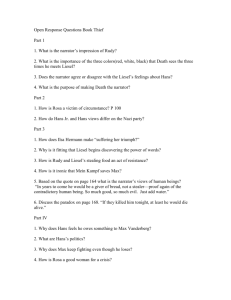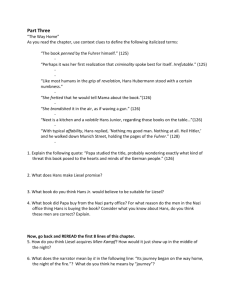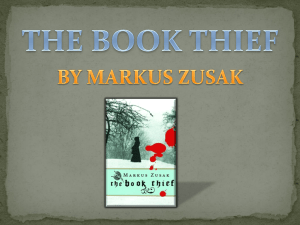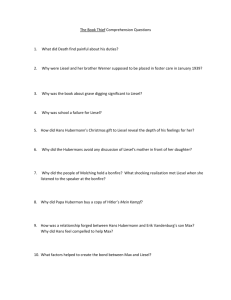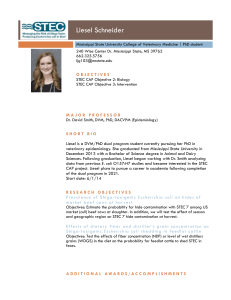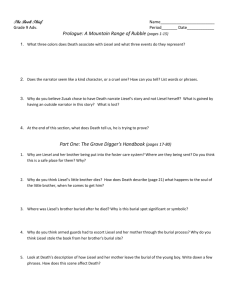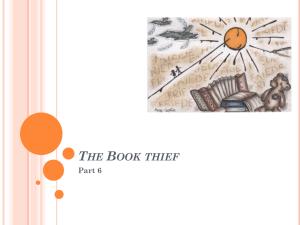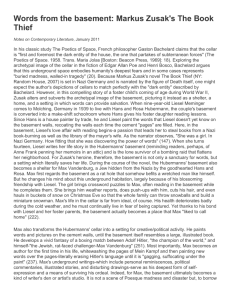The Book Thief character analysis
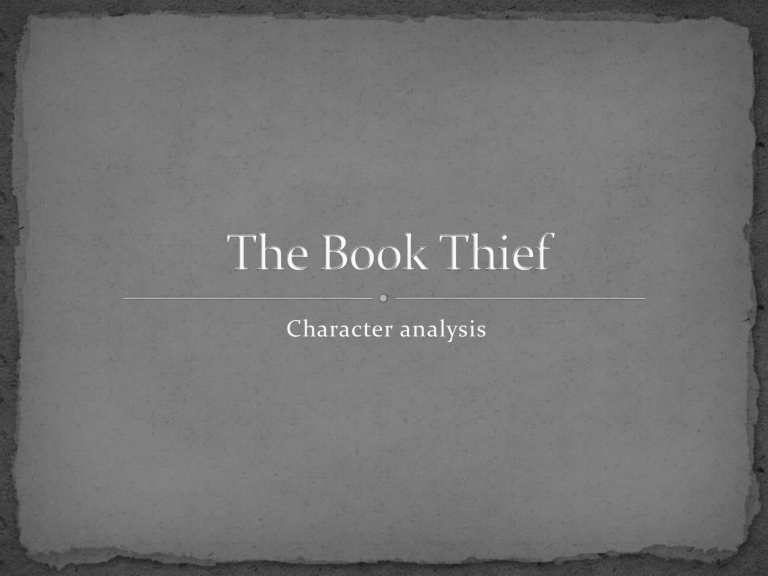
Character analysis
A German girl whose mother has given her up to the foster parent system. She can’t figure out why her mother would do such a thing, but remembers rough incidents from her childhood that suggest her father was a Communist.
On the way to her foster parents’ home, she loses her brother. The memory of his death and loss acts as a basis for her nightmares and, ultimately, the bond between Hans and herself.
Her relationship with Hans was formed almost as soon as they met;
Hans was the only one that was able to coax her to get out of the car...
“quietly.” (p.28) Liesel knew instantly that “she would have no trouble calling him Papa.” (p.36)
Liesel’s relationship with Rosa is initially defined by the derogatory names Rosa calls her. Liesel soon learns that this language is just a hard shell that protects the soft heart within.
WWII is happening in the background of Liesel’s story; she still lives a normal life in spite of this.
Liesel has a certain goodness about her which draws people to her. E.g.
Rudy, Hans, Ilsa Hermann, Max. Despite this, Liesel also roams the neighbourhood with Rudy Steiner and causes much havoc. E.g.
Stealing books and food. –Note that it’s not thrill that drives her, but necessity.
She recognizes the similarities between herself and Max even before he consciously meets her, as she studies him during his three day slumber when first arriving. She notes that “in the act of watching, was already noticing the similarities between this stranger and herself. They both arrived in a state of agitation on Himmel Street. They both nightmared.”
Important note: Max’s presence in the Hubermann house ended
Liesel’s childhood naivety.(p.231)
A house-painter by trade. Has trouble finding work because he was once kind to a Jewish family when the German law forbade that. (p.196)
This suggests an unconditional fairness about his character, putting what’s right before his own good.
He is true to his word; when a soldier volunteers Hans to remain in camp during WWI, the rest of the squad is killed. Hans believes that the soldier saved his life and promises that if the man’s wife and son ever need his help, he would provide it. This is how Max becomes connected with Hans.
Hans’ ultimate mistake is when he gives in to his pity for the starving
Jews being marched through Molching and offers him some bread.
A hero in his own way.
Described as “The Woman with the Iron Fist.” (p.37)
Rough by nature and has a vulgar tongue. She often refers to Liesel as
‘saumensch’, although the term becomes one of endearment, rather than of malice.
Despite the vulgarity, Rosa is a soft-hearted woman deep down. She takes Liesel and Max into her home, even though she does not know where her next meal will come from.
Has her moments of compassion. E.g. Momentarily comforts Liesel after she spends the laundry money on posting letters to her mother.
(p.107), accepts Max into her home despite that posing an obvious danger to her life.
Rosa does not know how to show emotion. Her tyrannical nature and independence disappears with Max’s arrival. (p227)
Erik Vandenburg, Hans’ military buddy saved Hans in WWI. As a result, Hans offers the soldier’s wife his help in anything she might ever need. Over 20 years later, Max turns up on Hans’ front door step and seeks his help.
He hides in the Hubermann’s basement where he spends most of his time reading Mein Kampf.
Max’s friendship with Liesel is one of a kind. He recognizes a calm goodness about her and is drawn to her immediately. She describes him as having ‘hair like feathers’, a title that he thinks about often.
Consider that not many beautiful words were directed at him as a Jew living in that time and place. This is one reason why Liesel earns his trust immediately. ‘Max and Liesel were held together by the quiet gathering of words.’ (p.268)
It is on her birthday when she recognizes how alone he is. He decides to give her a gift, The Standover Man.
Max and Liesel have the fundamental basics in common; p.238 and they talk about this often. They share their nightmares and eventually become inseparable. Liesel eventually becomes Max’s eyes when he asks her to describe the sky to him. ‘It was when Liesel came down however, that Max found himself most interested in life again ... Each time with a new weather report.’ (p.270)
Max’s presence in Liesel’s life ends her childhood naivety that she notices in Rudy. She learns the art of secrecy through him.
Max dreams of being in a boxing ring with the Fuhrer, his anger at
Hitler fuelled by Mein Kampf. ‘The Boxer’ (p.270) depicts Max’s desire to defeat Hitler’s plan and also reflects his self-image. Note how he imagines himself dressed, as opposed to how Hitler is. His self-image suffers so much that he is reduced to think that the Hubermann’s cold, wet basement for accommodation is ‘Better than I deserve.’ (p.226)
The living conditions of the basement eventually reduce Max to a dangerously sickly state. Despite having lost hope and the willingness to live, topped with the guilt of endangering the lives of the
Hubermann’s and Liesel, one thing keeps him going: Liesel.
‘Often I wish this would all be over, Liesel, but then, somehow you do something like walk down the basement steps with a snowman in your hands.’ (p.335).
When he falls unconscious, Liesel pleads with him to wake up, brings him several gifts in hope they will wake him and reads to him several times a day.
Hans ends Max’s stay when he foolishly hands out a piece of bread to a marching Jew and is caught by the guards. Hans is afraid he will be arrested and his house searched. (p.423)
